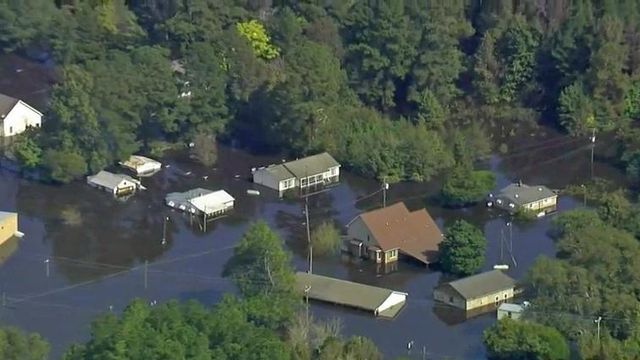Congress members want Cooper to explain slow distribution of Matthew recovery money
Eight members of North Carolina's congressional delegation on Friday sent a letter to Gov. Roy Cooper to find out why the state has been so slow in doling out federal recovery funds following Hurricane Matthew.
Posted — UpdatedNorth Carolina received about $400 million in federal community development grants after the October 2016 hurricane flooded many eastern counties, but as of the beginning of this month, only about $40,000 had been passed on to storm survivors. The rest was still tied up in red tape.
"Our offices invested significant time and resources to assist those impacted by Hurricane Matthew. During and after the storm, we made every effort to support the agencies and nonprofits who came to North Carolina to assist our residents. Therefore, it is troubling to learn that these [grant] funds are delayed in reaching those in most need of assistance," Republican U.S. Sens. Richard Burr and Thom Tillis and republican Reps. George Holding, Walter Jones, Virginia Foxx, David Rouzer, Richard Hudson and Robert Pittenger wrote in the letter.
"It is even more frustrating to learn that, according to [the U.S. Department of Housing and Urban Development], our state is not within the monthly spending pace required to fully use the assistance by the target closeout date of August 2023 and has been designated a 'slow-spender,'" they wrote. "North Carolina has the potential to lose millions of dollars in disaster relief aid if it continues to allocate funds at this rate."
State lawmakers have also expressed frustration over the slow distribution of recovery funds, blistering state Division of Emergency Manager Director Mike Sprayberry and other members of Cooper's administration in recent legislative hearings.
Sprayberry has blamed the response on the multiple steps people have to go through to qualify for the grants and his department's unfamiliarity with administering them.
Cooper spokesman Ford Porter said the state has already distributed $630 million in state and federal recovery funds, and getting HUD funds to people who qualify "is a top priority."
"The first [grant] disbursements have been sent, and construction is slated to begin this summer," Porter said in an email.
Legislative leaders said Friday that they plan to include $60 million in disaster relief funding in the 2018-19 state budget, which is expected to be rolled out and voted on next week.
House Majority leader John Bell, R-Wayne, said floods from Hurricane Matthew damaged hundreds of homes and businesses in his district and surrounding areas, and it's tough to know money there to help remains just out of reach.
"We have people now that are in a situation where they're in a [Federal Emergency Management Agency] trailer or they've been removed from their house, and they're having to pay a mortgage and now having to pay rent back to FEMA or have them pay rental assistance et cetera. So, we're trying to help those folks," Bell said.
About $25 million of the money will be used for housing needs like elevation, acquisition and mitigation reconstruction for residences not covered by federal grant programs. Another $14 million would provide a state match for federal assistance.
About $9 million would go to state agencies to pay for disaster preparation efforts, equipment and training, while $10 million would go to other relief oversight agencies, such as Golden LEAF, which has gotten grants moving much faster. Bell said other funds are set aside for Princeville and Fair Bluff to help the towns hire consultants to speed up federal assistance for rebuilding efforts.
Money also has been set aside to replace old river gauges. Bell said some of the gauges in the Neuse River basin didn't give accurate readings during the hurricane, making it harder for emergency officials to predict how high floodwaters would get downstream.
Related Topics
• Credits
Copyright 2024 by Capitol Broadcasting Company. All rights reserved. This material may not be published, broadcast, rewritten or redistributed.






